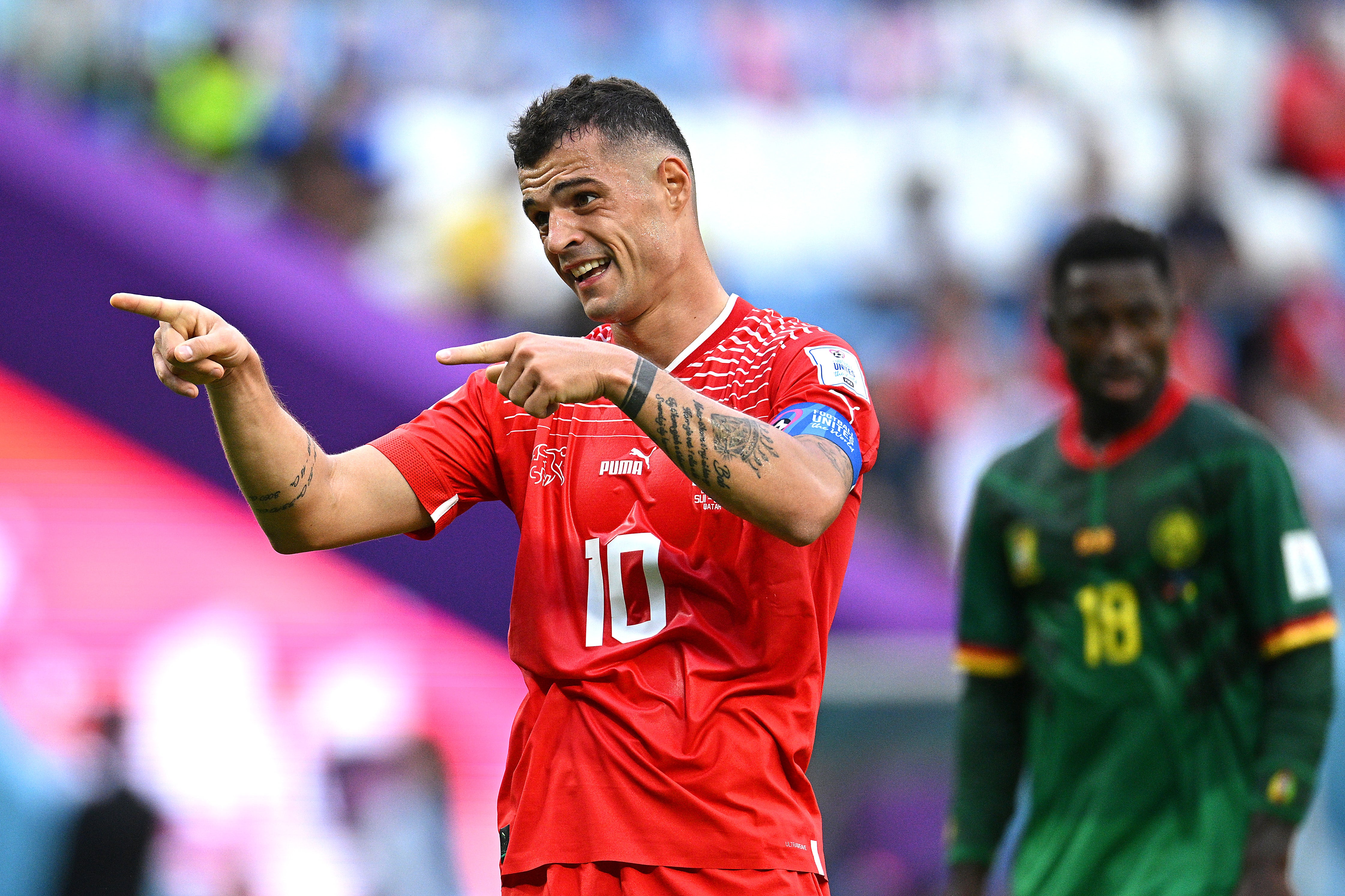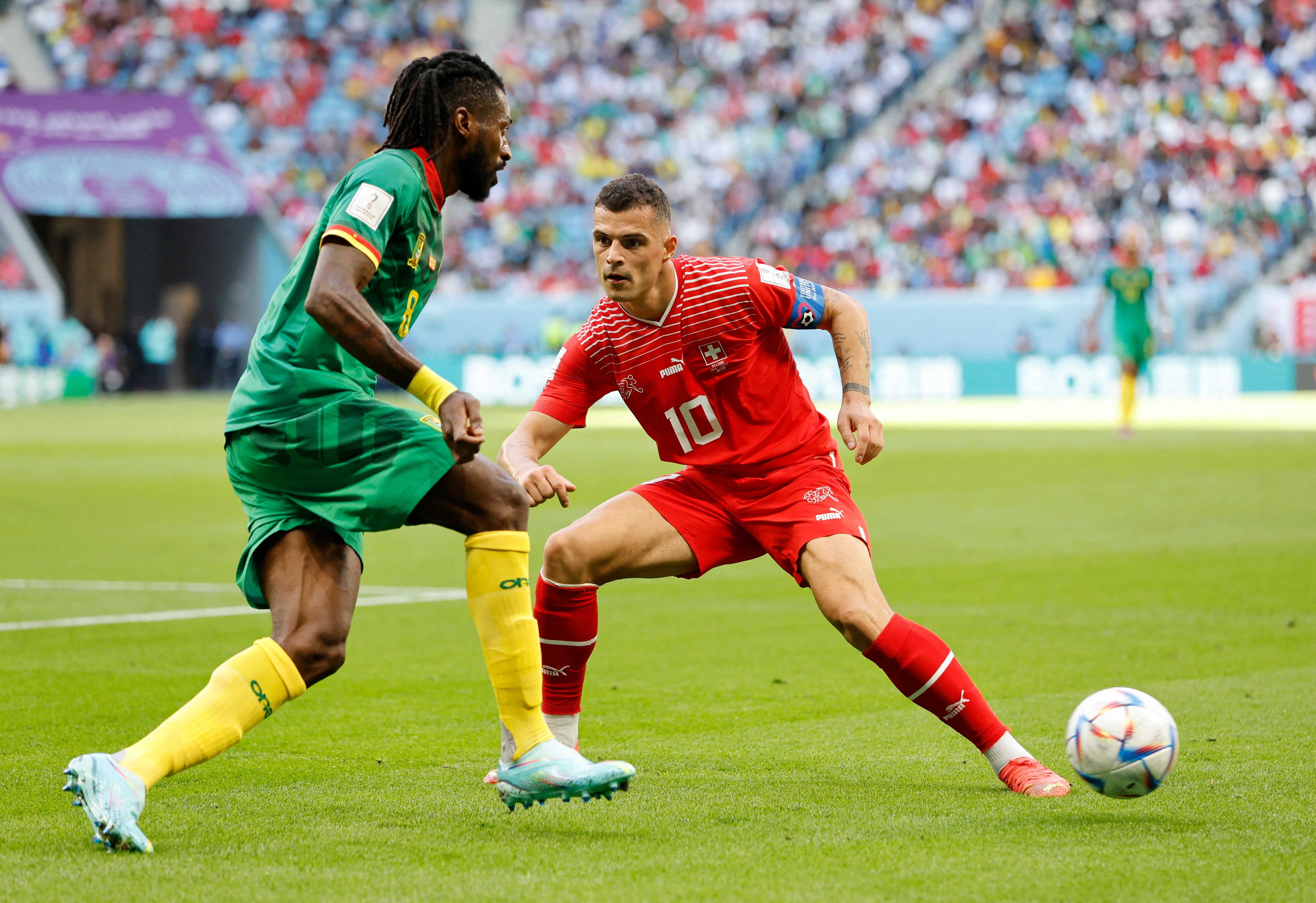Switzerland should emulate Arsenal to unlock Granit Xhaka after laboured Cameroon win
Breel Embolo scored the only goal in a 1-0 win over Cameroon but captain Xhaka can offer the Swiss so much more

Your support helps us to tell the story
From reproductive rights to climate change to Big Tech, The Independent is on the ground when the story is developing. Whether it's investigating the financials of Elon Musk's pro-Trump PAC or producing our latest documentary, 'The A Word', which shines a light on the American women fighting for reproductive rights, we know how important it is to parse out the facts from the messaging.
At such a critical moment in US history, we need reporters on the ground. Your donation allows us to keep sending journalists to speak to both sides of the story.
The Independent is trusted by Americans across the entire political spectrum. And unlike many other quality news outlets, we choose not to lock Americans out of our reporting and analysis with paywalls. We believe quality journalism should be available to everyone, paid for by those who can afford it.
Your support makes all the difference.In some ways, Switzerland’s World Cup got off to the perfect start with a 1-0 win over Cameroon. Going into their second game against Brazil, the Swiss have three points on the board and don’t require a shock victory over the pre-tournament favourites to keep their knockout hopes on course.
Yet it was a laboured win, with Cameroon the better side in the first half and unlucky not to be ahead by the break, before their European opponents scored through Cameroon-born Breel Embolo early in the second period and subsequently suffocated the life out of the game.
No-one could legitimately argue the Swiss attack was firing on all cylinders but the answer to unlock their potential is already in their ranks and goes by the name of Granit Xhaka. The captain won his 107th cap in Qatar, and has been a key cog since making his debut in 2011, as proven by playing every minute of their recent Nations League campaign, but it’s time to change his role in the side to turn them into legitimate contenders.
Xhaka has been a revelation for Arsenal this season and his transformation from persona non grata at the Emirates - where, at the nadir of his relationship with Gunners fans, he swore and made sarcastic gestures at them after being subbed against Crystal Palace in 2019 - to beloved key figure in a side sitting top of the Premier League is remarkable.
It’s a transformation for which manager Mikel Arteta, as well as the player himself, deserves huge credit. Throughout most of his time in north London, the 30-year-old has been a deep-lying midfielder, protecting the back four and offering little in the opposition’s final third. Yet this year, he has been a man unleashed.
He has become an incredibly effective box-to-box midfielder as a left-sided No 8, with Martin Odegaard occupying the same role on the opposite side. The number of passes he makes are down by about 15 per cent, with Thomas Partey now the closest port of call for Arsenal’s defenders to find in possession, but those he does make are more telling. He is creating more, has twice as many touches in the opposition box and has become an attacking force. He has already scored four goals - the same amount he netted in the previous three seasons combined - in addition to a slew of assists. And he covers more ground than any of his teammates with his diesel engine.
In short, the 2022 version of Granit Xhaka is exactly the sort of player that a goal-shy Switzerland could use. Their 15 goals were the joint-fewest of any group winner in European qualifying and eight of those came in just two games against Lithuania and Bulgaria.

Yet his role for the national team, as shown in their World Cup opener against Cameroon, is different. He brings balance and stability as a shield for the back four, with the thinking being that he can drive them forward out of defence. He still notches the occasional spectacular goal - although perhaps he should score more - but he’s less of a threat in the opposition half, with Xherdan Shaqiri, Djibril Sow, Ruben Vargas et al entrusted with the creative responsibilities behind frontman Breel Embolo.
It’s a role which hasn’t always sat well with the vocal midfielder - he is a straight-talker and there were rumours of a rift with coach Murat Yakin in June, where Xhaka’s comments about the team’s tactics were perceived to be a criticism of his boss. Both men played it down but there’s a sense that Xhaka believes he has more to offer.
Judging by the opening game in Qatar, he is right. He was reasonably solid in his role as defensive shield but Cameroon still carved through the Swiss in the first half, with Eric Choupo-Moting and Karl Toko-Ekambi both missing superb chances after defence-splitting balls. After the break, he did help his side starve the African side of possession as they held on for the win but a second goal thanks to more attacking flourishes would have made for a more comfortable ride.
There were glimpses of him in attack - an 11th-minute shot from range flew well over the bar and he nearly put the result beyond doubt with another effort from outside the box in the final couple of minutes but Andre Onana was equal to his low, skimming strike. An early dinked ball over the top was millimetres beyond the stretching Silvan Widmer as well but, generally, the attacking onus was left to his teammates.
Switzerland got the win they needed, so perhaps it’s harsh to be too critical but fix the roof when the sun is shining, as they say. The Swiss offered little in attack to worry group favourites Brazil, or maybe even defensively-sound Serbia, let alone any side they may face in the knockouts.
They don’t require a complete overhaul of their tactical system, just a little less granite - if you will - and a little more flair from Xhaka. He is waiting to be unlocked and, as Arsenal found, the results can be transformative.
Join our commenting forum
Join thought-provoking conversations, follow other Independent readers and see their replies
Comments